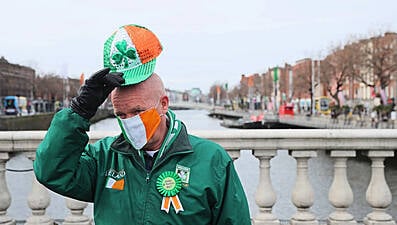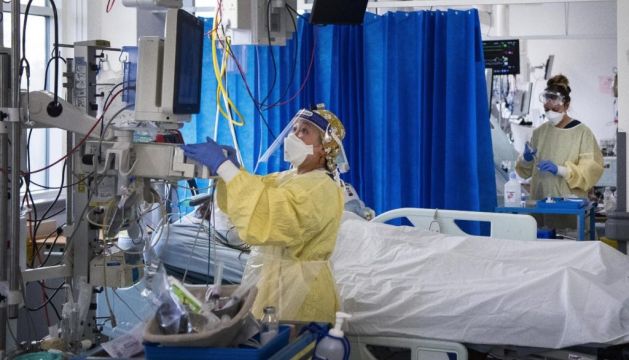Updated: 3.20pm
Covid-19 hospitalisations surpassed 1,000 patients on Monday for the third time during the pandemic in Ireland.
The increase comes as the Department of Health confirmed 9,371 new cases of the virus on Monday - 2,100 confirmed through PCR testing and 7,271 uploaded to the HSE's antigen result portal.
Figures for the weekend have also been released, with 11,253 cases on Saturday and 11,266 on Sunday. Of those, 9,875 were verified by PCR test.
There were 1,042 confirmed cases of the virus in hospitals around the country as of 8am on Monday, with 145 newly confirmed cases and 35 discharges seen over the last 24 hours.
The number hospitalised with Covid-19 has risen above 1,000 twice before during the pandemic, peaking at 2,020 in January 2021 and at 1,063 in January 2022.
Intensive care consultant Dr Catherine Motherway said she was “a little concerned” at the increase in cases in recent days and the impact such figures could have on the health system, but said the high figures were not translating into critical care illnesses.
It was also not possible to determine if the numbers at present in hospital with Covid-19 were there as a consequence of the virus, or if they were in hospital with other issues and happened to test positive for Covid-19, she said.
There were 42 Covid-19 patients in intensive care units (ICU) as of this morning, she said, 16 of whom were being ventilated.
Five intensive care admissions were seen over the last 24 hours, along with one discharge. ICU numbers have been trending largely downwards since the most recent peak of 132 in November 2021.
Chronic overcrowding
Amid rising Covid-19 hospitalisations and chronic overcrowding in emergency departments and wards, the Irish Nurses and Midwives Organisation (INMO) said that the “highly transmissible airborne virus is making its way around our hospitals.”
There were 544 patients on trolleys this morning in Irish hospitals, alongside the 1,042 patients in hospital with the virus, as the health service heads into a traditionally “extremely busy week” in emergency departments.
INMO general secretary Phil Ní Sheaghdha said the numbers on hospital trolleys, combined with the numbers with Covid-19, were “a recipe for disaster”.
“If our past experience of Covid and high numbers of patients on trolleys has taught us anything, we will be seeing the impacts of this on our health system for many weeks to come,” she said.
There must be no tolerance for hospital overcrowding while a highly transmissible airborne virus is making its way around our hospitals
“INMO members have been sounding the alarm on the rise of trolley numbers since mid-summer, and we also urged caution on the removal of mandatory mask wearing in public spaces.

“The HSE and political system have a responsibility to the exhausted workforce to ensure their workplaces are safe.
“There must be no tolerance for hospital overcrowding while a highly transmissible airborne virus is making its way around our hospitals. Improvements to air quality in our hospitals must be a priority.
“If non-emergency services need to be curtailed in order to allow the HSE and hospital groups to get a handle on out-of-control trolley figures and Covid cases within the hospital system, then that must be done.
“The current state of our health system is extremely concerning. It is now time for the Minister to attend the ED taskforce and to ask the HSE to put in place realistic short term pressure reliving measures.”







